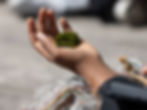How is care and community cultivated within a fashion education context? Centre for Sustainable Fashion’s (CSF) education team have been crafting ways we can nurture collective kinship, agency and resilience amongst a fluctuating education environment and fashion sector.

We launched CSF Community Sessions in the spring term of 2024/5; a continuing programme of activities developed to extend our practices of care and collaboration within University of the Arts London (UAL), for students, staff and our wider community. The sessions, typically formatted as collaborative workshops, aim to create points of connection and amplify engagement with sustainability through informal pastoral learning environments. The rationale for this programme was built on an understanding of how a sense of belonging can not only enhance learning but contribute to community building.
Within the education team, we’ve been exploring the concept of ‘commoning’; the practice of creating and sharing resources within a community through collective action and shared governance. This has led us into an ongoing enquiry exploring what a fashion commons might look like, and the CSF community sessions have been a crucial testbed in developing these practices. Through these sessions, we aim to create common spaces for investigation into fashion sustainability, thus fostering a commons for the subject whilst escaping from the boundaries of traditional education agendas (Korsgaard, M.T. 2018). Alongside these, we have been exploring the commons through other experimental pedagogic approaches at CSF. Most notably, we recently hosted a Walking Conversation at this year’s annual IFFTI Conference, Forming Futures, held at London College of Fashion, which focused on how this simple physical activity can enable critical reflection and invite new ways of learning.
We hosted one of our recent community sessions, Exploring Fashion & Nature with CSF, as part of the Climate Emergency Network’s 2025 Earth Week programme at UAL. This session invited students and staff to join us in a hopeful investigation into our more-than-human world in the context of fashion. On Earth Day, together with an intimate group of participants and contributors, we spent over an hour exploring how our experiences in our work, studies and everyday lives recognise their ecological context and as a result, have the power to shape and enhance our relationship with nature.
The workshop started with a simple provocation: How can fashion value nature? This question is interesting – it invites people to consider what we can do, rather than what is wrong. When nature is discussed in a fashion context, our minds jump to the overwhelming data around the industry’s negative impacts on the environment, which can lead to a kind of action paralysis brought on by emotions of hopelessness and anxiety. However, in the case of this question, we are contemplating fashion’s relationship with nature, and more importantly our own relationship with nature and how we can nurture this to make better choices. We then had some contributions from staff, students and the CSF team on their own experiences with fashion and how this has shaped their relationships with nature.
From stories of activism and community mobilisation to celebrations of heritage and culture – what became evident during this part of the session is that we can all find connection through sharing our experiences, discovering parallels and fostering a sense of collective belonging. In the context of the workshop theme, all contributions gave voice to the fact that everything in fashion comes from nature, highlighting its intrinsic relationship. For example, one contributor spoke of their experience as a natural dyer and how they have fostered a deep respect for the plants they work with, viewing them as a collaborator in their work rather than a material they simply use. This careful consideration for nature’s involvement in fashion practice led them to recognise that we can learn from the natural systems around us, framing nature as a guide and thus foster a deeper sense of connection to our more-than-human world.

The workshop concluded with a final provocation: How can we continue to nurture points of connection with our more-than-human world? This is a question we have been pondering, and while we don’t have a definitive answer (nor do we expect to find a unanimous one), what we do know is that we need to keep fostering spaces for storytelling and critical reflection as a starting point. If we can convene to share our experiences of nature, this will naturally encourage us to seek further experiences in nature, which in time helps us to reconcile our place within the ecosystems we are part of. It is this hopeful consideration that propels us to continue to build our CSF community through collaborative explorations into how we can encourage a just transition to a more positive fashion system. Systems change takes myriad approaches – valuing the quiet, communal, convivial collaboration is just as important as the loud and busy work.
We are in the process of developing a programme of activities for the upcoming 2025-26 academic year, with lots of opportunities for collaboration, contribution and investigation. Please keep an eye out on our social media platforms (LinkedIn, Instagram, X), sign up to our newsletter and stay tuned for more information soon.
Korsgaard, M. T. (2018) ‘Education and the concept of commons. A pedagogical reinterpretation’, Educational Philosophy and Theory, 51(4), pp. 445–455. doi: 10.1080/00131857.2018.1485564

